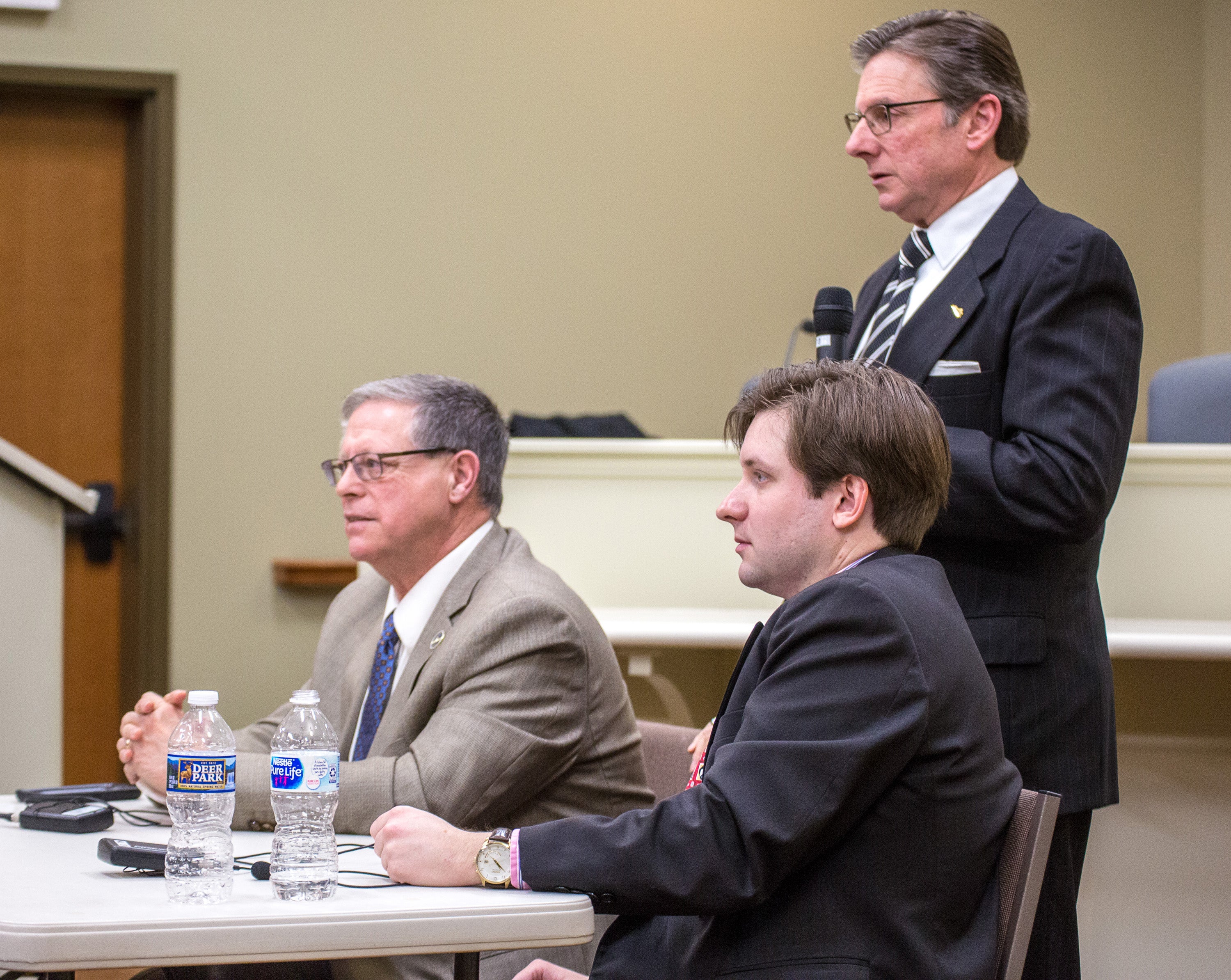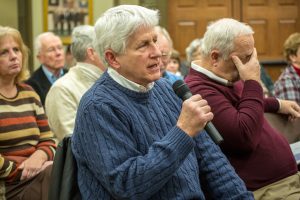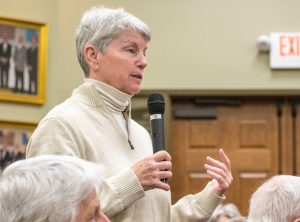Herrington Lake, environmental issues addressed at ‘legislative coffee’
Published 8:41 am Wednesday, February 7, 2018

- State Sen. Rick Girdler, left, and state Rep. Daniel Elliott, center, participate in a "legislative coffee" event Monday at Danville City Hall. The event was moderated by Danville Mayor Mike Perros, standing. (Photo by Ben Kleppinger)
While pensions and taxes dominated much of the conversation at this week’s “legislative coffee” town hall event with Danville’s state representative and senator, environmental issues related to Herrington Lake were also brought up.

Tom Ellis asks his elected representatives to support resolutions opposing a plan to repurpose a natural gas pipeline that runs through Boyle County and over Herrington Lake. (Photo by Ben Kleppinger)
“While I understand the state cannot do anything about the Kinder Morgan pipeline, the devastating effects … if there were a leak, if they got NGLs into the water system, we would have the second dead sea on the planet,” said Tom Ellis, a constituent who attended the approximately 90-minute event Monday morning at Danville City Hall.
Ellis was commenting on a plan from Houston-based energy company Kinder Morgan to repurpose a natural gas pipeline, part of which runs through Boyle County and over Herrington Lake. Kinder Morgan wants to pipe “natural gas liquids,” byproducts of fracking in shale fields in the northeast, through Tennessee Gas Pipeline No. 1, south to the gulf coast area, where the NGLs could in theory be used to create plastics.
Opponents of the plan like Ellis say the pipeline wasn’t built for the heavier and more explosive NGLs and a leak could create immediate safety problems, as well as long-term environmental damage.
“Having spent years up there (in Frankfort), I do understand the power of House and Senate resolutions,” Ellis said. “I would just encourage you to think about a joint sponsorship on Kinder Morgan and the devastating effect that it could have on the environment, on farming, on human life, all of agriculture and economic development.”
“That’s a good idea,” state Rep. Daniel Elliott (R-Danville) said. “I think that’s a great suggestion.”
State Sen. Rick Girdler asked Ellis to come up with the text of what such a resolution might look like.
“We can send it to a drafter and then we can go from there,” Girdler said.
Another constituent asked if the General Assembly had studied documentation about the pipeline proposal and “how it would affect commerce.”
Elliott said he didn’t know for sure, but that sounded like a good idea.
“I didn’t even know until I started running about the pipeline,” said Girdler, a Republican from Somerset in Pulaski County, through which the pipeline does not cross. “… As far as knowing the impact money-wise or whatever jobs-wise or anything else, I haven’t heard anything other than the fact I’m dead set against it just because of what you all have told me and what Daniel says. So it would be very hard to get anything done through us.”

Julie Pease asks what her elected representatives will do about an issue she and other local residents have with the handling of buried coal ash they believe is poisoning Herrington Lake. (Photo by Ben Kleppinger)
Julie Pease said the pipeline issue isn’t the only problem facing Herrington Lake.
“I live on the lake and I feel like we’re getting it from all directions,” she said. “We have the pipeline issue and then on the other end of the lake, we have the coal ash issue.”
Pease was referring to millions of yards of coal ash buried behind E.W. Brown Generating Station in Mercer County. Residents are concerned about elevated levels of toxins found in the lake near the coal ash site, and a researcher, Dr. Dennis Lemly, has provided evidence the pollution is due to the presence of the coal ash.
Kentucky Utilities, the owner of the power plant, has questioned Lemly’s research and said it is working appropriately with the Kentucky Division of Water to figure out the source of the pollution and conduct any appropriate remediation.
“I hope you guys are up-to-date on what is happening to the water,” Pease said to Girdler and Elliott. “… I fear that it is being minimized. I feel like it is an issue that has been — pardon the pun — buried. KU is saying, ‘yes, we’re capping the coal ash pond, the original one, but (it is) unlined. So they’re not removing the issue, they’re just capping it. So the toxins continue to go into the ground, into the groundwater, into our lake.”
Pease said she hopes Elliott and Girdler have seen the results of Lemly’s study of fish in the lake, showing deformities caused by exposure to pollution.
“What happens if … we no longer have fish stock in that lake? There are people that rely on fishing in the lake to feed their families,” she said. “That’s our drinking water and I don’t understand why there isn’t more of an outcry … I’m asking if you both can do something to push the cleanup of that. They have a plan — I understand — they call it a corrective action plan, but it’s essentially a study plan — it doesn’t say how they’re going to remediate the issues in the lake.
“… The pipeline eruption would be a devastating impact on this community, on this county, on other counties. This will also be a devastating impact on this county, on other counties.”
Danville Mayor Mike Perros, who moderated the event, said Herrington Lake feeds the Dix River, which is the largest tributary running into the Kentucky River.
“Downstream from the Dix River, you’ve got Frankfort, you’ve got Carrolton, you’ve got a number of communities that draw water,” Perros said.
Elliott said he has read about the reports and “they are troubling to say the least.”
“I’d be happy to meet with you and to talk to you about what suggestions you would have,” Elliott said to Pease. “That’s not an issue that Sen. Girdler and I have really been contacted about. We are aware of it.”
Girdler invited Pease to “come to Frankfort” and attend some committee meetings. “I’m green at this; I haven’t kept up with it like I’m sure (Elliott) has.”






